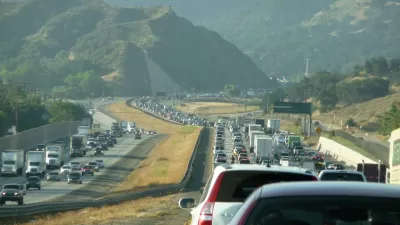Thirty years ago Peter Newman and Jeff Kenworthy introduced the concept of automobile dependency. In this article they reexamine the evidence, consider criticisms, and discuss how their insights changed—sometimes painfully—planning practices.

The abstract for "Gasoline Consumption and Cities Revisited: What Have We Learnt?":
This article provides a personal reflection 30 years after we created the concept of automobile dependence. The paper entitled “Gasoline Consumption and Cities: A Comparison of US Cities with a Global Survey and Its Implications” and an associated book “Cities and Automobile Dependence” stirred up transport planning, especially in the US. We examine the criticisms, [sic] this evoked at the time within the perspective of what has happened in cities since then. Key policy prescriptions of re-urbanizing cities and prioritizing transit, walking and cycling, [sic] have been largely mainstreamed, though not without some painful changes in professional practice such as road capacity increases being seen as the only solution to traffic. Urban planning and transport policies adopted in innumerable cities worldwide have moved to reduce automobile dependence, though academic and policy debate continues. The future is likely to continue this debate, especially over autonomous cars where there will remain a fundamental need to keep cities on a path of reduced automobile dependence by ensuring that hard-won principles of reurbanization of corridors, integrated with new transit alternatives and walkability at precincts/stations, are given the highest priority.
The entire study, published in Vol.9 No.3, September 2021 of the Current Urban Studies journal, is available with open access at the link below.
FULL STORY: Gasoline Consumption and Cities Revisited: What Have We Learnt?

Alabama: Trump Terminates Settlements for Black Communities Harmed By Raw Sewage
Trump deemed the landmark civil rights agreement “illegal DEI and environmental justice policy.”

Study: Maui’s Plan to Convert Vacation Rentals to Long-Term Housing Could Cause Nearly $1 Billion Economic Loss
The plan would reduce visitor accommodation by 25% resulting in 1,900 jobs lost.

Planetizen Federal Action Tracker
A weekly monitor of how Trump’s orders and actions are impacting planners and planning in America.

Waymo Gets Permission to Map SF’s Market Street
If allowed to operate on the traffic-restricted street, Waymo’s autonomous taxis would have a leg up over ride-hailing competitors — and counter the city’s efforts to grow bike and pedestrian on the thoroughfare.

Parklet Symposium Highlights the Success of Shared Spaces
Parklets got a boost during the Covid-19 pandemic, when the concept was translated to outdoor dining programs that offered restaurants a lifeline during the shutdown.

Federal Homelessness Agency Places Entire Staff on Leave
The U.S. Interagency Council on Homelessness is the only federal agency dedicated to preventing and ending homelessness.
Urban Design for Planners 1: Software Tools
This six-course series explores essential urban design concepts using open source software and equips planners with the tools they need to participate fully in the urban design process.
Planning for Universal Design
Learn the tools for implementing Universal Design in planning regulations.
Caltrans
Smith Gee Studio
Institute for Housing and Urban Development Studies (IHS)
City of Grandview
Harvard GSD Executive Education
Toledo-Lucas County Plan Commissions
Salt Lake City
NYU Wagner Graduate School of Public Service





























